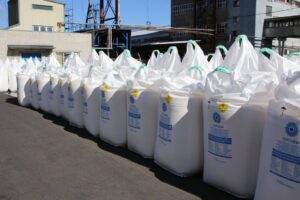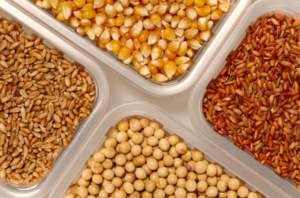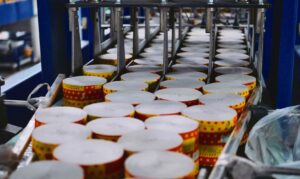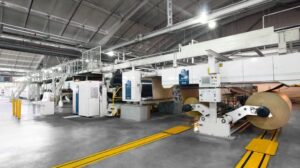
Plants of nitrogen holding Ostchem, which unites enterprises of nitrogen business of Group DF, produced 959.7 thousand tons of mineral fertilizers in the first half of 2023, which is 60.9% more than in the same period last year, when 596.3 thousand tons were produced.
According to the press release of Group DF on Wednesday, Rivneazot produced 201.2 thousand tons, Cherkassy Azot 758.6 thousand tons, including in May it reached the maximum since the beginning of the war – 138.6 thousand tons.
It is specified that the structure of production in the first half of the year corresponded to the structure of demand for nitrogen fertilizers, taking into account the prices of competitors and the margins of individual products. The key products were: ammonium nitrate – 398.7 thousand tons (313.3 thousand tons in 6M 2022); urea-ammonia mixture (UAN) – 277.7 thousand tons (116.8 thousand tons); urea – 205.9 thousand tons (76.4 thousand tons). At the same time, production of limestone-ammonium nitrate (UAN) dropped almost fourfold to 17.2 thousand tons.
“Ostchem’s enterprises have adapted to work under war conditions. Under the conditions of war risks, logistical problems, blackouts and unscheduled shutdowns, the plants managed to pass peak load periods and ensure timely shipment of fertilizers to agrarians clearly in accordance with the concluded agreements,” the report quotes Ostchem’s nitrogen business head Sergiy Pavliuchuk as saying.
According to him, at the moment the main task is to prepare production facilities for the fall season, and after the completion of repairs key workshops will be launched, and the load of plants in August will increase.
It is noted that the main factors that contributed to a successful spring season and the implementation of the production plan are increased demand from farmers and large agricultural holdings and increased sales due to soft loans, acceptable gas prices and lower fertilizer selling prices, as well as the spring sowing season delayed due to weather conditions.
“Our companies are ready to produce as much fertilizer as the market can buy. Illegal imports of repackaged Russian fertilizers are holding back the development of the domestic chemical industry,” said Oleg Arestarhov, Head of Corporate Communications at Group DF.
According to him, Russian fertilizers are imported to the customs territory of Ukraine from five countries of the former Soviet Union. In particular, Arestarhov specified, since the beginning of this year, 382.8 thousand tons of urea were imported into Ukraine, including 269.5 thousand tons from Turkmenistan, Uzbekistan and Azerbaijan, while domestic production amounted to 205.9 thousand tons.
“With such a volume of imports, it will be much more difficult for urea producers such as Dniprazot and OPZ, which are now standing, to start up,” said the head of Group DF’s corporate communications department.
The release also notes that Ostchem will continue to increase production volumes in new sectors of chemistry. In particular, the company counts on AdBlue – a liquid reagent for diesel cars, the production volume of which amounted to 4.2 thousand tons in the first half of the year.
In addition, production of carbon dioxide in the first half of 2023 amounted to 10.1 thousand tons, while during this period Cherkassy Azot has been increasing its output on a monthly basis, and Ostchem has started to develop its logistics infrastructure to ensure stable supplies of industrial gases both in Ukraine and Europe.
Group DF consolidates Dmytro Firtash’s assets in the gas distribution, chemical, titanium and port industries, as well as in agriculture and media.
Ostchem is the nitrogen holding company of Group DF, which unites the largest mineral fertilizer producers in Ukraine. It includes Rivneazot, Cherkasy Azot, as well as Severodonetsk Azot and Stirol, which are out of operation and located in the occupied territories.

Global cereal production will reach a new record in the 2023/2024 crop year thanks to strong corn harvests in the US and soybean harvests in Brazil, the International Grains Council (IGC) has forecast.
It estimates total cereal production of 2.297 billion tons in 2023/2024, compared with 2.259 billion tons in 2022/2023 and 2.295 billion tons in 2021-2022.
Wheat will produce 784 million tons, corn 1.22 billion tons, rice 527 million tons and soybeans 400 million tons, according to the IGC forecast.
“Cereal consumption could increase by 2 percent and also reach a record high, given rising demand for cereals in food, feed and industrial uses,” the organization said in its review.
IGC estimates that cereal consumption will reach 2.306 billion tons in the 2023/2024 crop year.

Kyiv Macaroni Factory LLC has mastered the production of a new type of product – bows – using previously installed equipment that had been idle for a long time, said the company’s owner, Alexander Barsuk.
“One of the most complex elements of pasta is butterflies (bows). Kyiv Pasta Factory has mastered the production of this product. This is not new equipment, although it is from a well-known European manufacturer. Previously, it refused to work, and everything was somehow wrong. They also blamed the flour. But we found better flour and set up production. The first batches already have a guaranteed order,” he wrote on Facebook.
According to the owner of the company, the new product will be packaged in 800-gram packages.
Answering customers’ questions about why the product is not packaged in kilogram packages, he explained that all packs on supermarket shelves should be the same size. The type of pasta – bows – is bulky and does not fit in a standard pack.
Mr. Borsuk added that the company is working on new types of pasta, which it will soon introduce to customers.
According to the website of the Kyiv Pasta Factory, which is part of the Yaroslav Group (Kyiv), it is the largest pasta company in Ukraine. Its products are supplied throughout the country and to neighboring countries.
In 2022, Kyivska Macaroni Factory LLC reduced its net loss to UAH 4.576 million from UAH 8.19 million a year earlier, and its revenue to UAH 103.244 million from UAH 116.906 million.
According to Yaroslav’s website, its production facilities include Yaroslav PE (Kyiv), Promin Factory (Dymer, Kyiv region), Boguslav Clothing Factory (Kyiv region), Steblivska Cotton Spinning and Weaving Factory (Cherkasy region), and Krolevets Clothing Factory (Sumy region).
The main specialization is the production of bed linen, rugs, blankets, mattresses, goods for children, and kitchen textiles.
Yaroslav’s director and owner, Oleksandr Borsuk, previously reported that he annually invests about $1 million in equipment and modernization of production facilities.

Beer production in Ukraine in the first six months of this year reached 65.2 million dal, up 112.5% year-on-year, according to the website of the industry organization of brewers Ukrpyvo.
This figure is only 76.9% of the volume of beer production in Ukraine in 2021, the industry association said.
As reported, beer production in Ukraine in 2022 decreased by 27.9% compared to 2021 – to 122.8 million dal.
By the end of 2022, the brewing industry had partially recovered from a 50% drop in production in the first quarter due to the Russian invasion and the shutdown of some breweries. Thus, in the first four months of 2022, the decline amounted to 42.8% compared to the same period in 2021, January-May – 36.4%, January-June – 32%, January-July and January-August – 31.6% each, January-September – 30.5%, January-October – 28.6%, January-November – 28.1%, and 27.9% in the year before last.

Kokhavyn paper mill (KBF, Lviv region), which produces sanitary and hygienic paper products (TM “Kokhavynka”), in January-June 2023 increased production by 30.3% compared to the first half of 2022 – up to UAH 562.76 million, according to statistics of the association “UkrPapir”.
According to the data provided to the agency “Interfax-Ukraine”, thus, the factory maintains the growth of this indicator more than 30% to the same period last year (at the end of five months it was 32.4%).
In physical terms, production of paper-base for sanitary-hygienic products increased by 2.7% – up to 20.82 thousand tons. Including in June, its output decreased by 4% against June-2022 – to 3.4 thousand tons.
The output of toilet paper in rolls in the first half of the year increased by 3.7% to 67.15 mln pieces. KBF retains the second place in its output after Kiev Paper Mill (120.78 mln pieces).
Kokhava Paper Mill, which has been operating since 1939, produces base paper for sanitary and hygienic goods, as well as toilet paper and paper towels.
The capacity of paper machines is 19 thousand tons per year, processing equipment – 90 million rolls per year.
The factory practically did not stop production since the beginning of Russia’s full-scale aggression in Ukraine.
As reported, KBF in 2023 produced UAH 975.3 million – 44.8% more than a year earlier. Net profit decreased by 12.7% to UAH 52.4m, while revenue increased by 46.5% to UAH 978.9m.

The volume of marketable output of Kyiv Cardboard and Paper Mill (Kyiv KBC, Obukhiv, Kyiv region), the leader of the Ukrainian industry by this indicator, amounted to UAH 3 billion 673.5 million in January-June 2023, which is 13.2% more than in the same period of 2022.
According to the statistics of the UkrPapir association provided to Interfax-Ukraine, in physical terms, the mill’s production of corrugated boxes increased by 30.4% to 108.24 million square meters. Cardboard output increased by 16.5% to 81.58 thousand tons, due to a 27.2% increase in production of containerboard to 66.91 thousand tons, while boxboard output decreased by almost 16% to 14.67 thousand tons.
On its Facebook page, the mill also reported that the installation of an automated Versor machine for gluing silicone and tear-off tape to produce a new type of product has been completed at the corrugated packaging production facility. Installation of folding and gluing line equipment is underway to expand production capabilities.
At the same time, according to “UkrPapir”, the production of base paper for sanitary-hygienic products, keeps negative dynamics: in January-June it decreased by 30.5%, to 21.08 thousand tons, while the production of toilet paper in rolls decreased by 29%, to 120.08 million pieces.
Despite the decline in toilet paper production, the mill maintains its leadership in its output in Ukraine. In general, for the first half of the year the main enterprises of the industry in Ukraine produced more than 289 million rolls (6% less).
As previously reported, the mill earlier noted that the market of sanitary-hygienic products in Ukraine has decreased by 18-35%, taking into account the general state of the economy, population reduction.
According to the data of the profile association, received from the main industry enterprises, in January-June 2023 in Ukraine recorded an increase in production of paper and cardboard by 9.8% (260.55 thousand tons), as well as by 18.3% – cardboard boxes (239.31 million square meters).
Kiev KBC is one of the largest enterprises in Europe for the production of cardboard and paper products with a staff of more than 2.5 thousand people.
As reported, in 2022 the mill produced UAH 7 bln 432 mln – 3.5% less than in 2021.